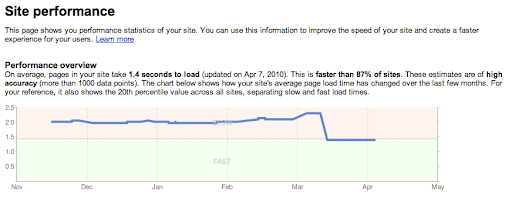Friday, April 09, 2010
You may have heard that here at Google we're obsessed with speed, in our products and on the web. As part of that effort, today we're including a new signal in our search ranking algorithms: site speed. Site speed reflects how quickly a website responds to web requests.
Speeding up websites is important—not just to site owners, but to all Internet users. Faster sites create happy users and we've seen in our internal studies that when a site responds slowly, visitors spend less time there. But faster sites don't just improve user experience; recent data shows that improving site speed also reduces operating costs. Like us, our users place a lot of value in speed—that's why we've decided to take site speed into account in our search rankings. We use a variety of sources to determine the speed of a site relative to other sites.
If you are a site owner, webmaster or a web author, here are some tools that you can use to evaluate the speed of your site:
- Page Speed, an open source Firefox/Firebug add-on that evaluates the performance of web pages and gives suggestions for improvement.
- YSlow, a tool from Yahoo! that suggests ways to improve website speed.
- WebPagetest shows a waterfall view of your pages' load performance plus an optimization checklist.
-
In
Webmaster Tools,
Labs > Site Performance shows the speed of your website as experienced by users around the
world as in the chart below. We've also blogged about
site performance.

- Many other tools on code.google.com/speed.
While site speed is a new signal, it doesn't carry as much weight as the relevance of a page. Currently, fewer than 1% of search queries are affected by the site speed signal in our implementation and the signal for site speed only applies for visitors searching in English on Google.com at this point. We launched this change a few weeks back after rigorous testing. If you haven't seen much change to your site rankings, then this site speed change possibly did not impact your site.
We encourage you to start looking at your site's speed (the tools above provide a great starting point)—not only to improve your ranking in search engines, but also to improve everyone's experience on the Internet.
